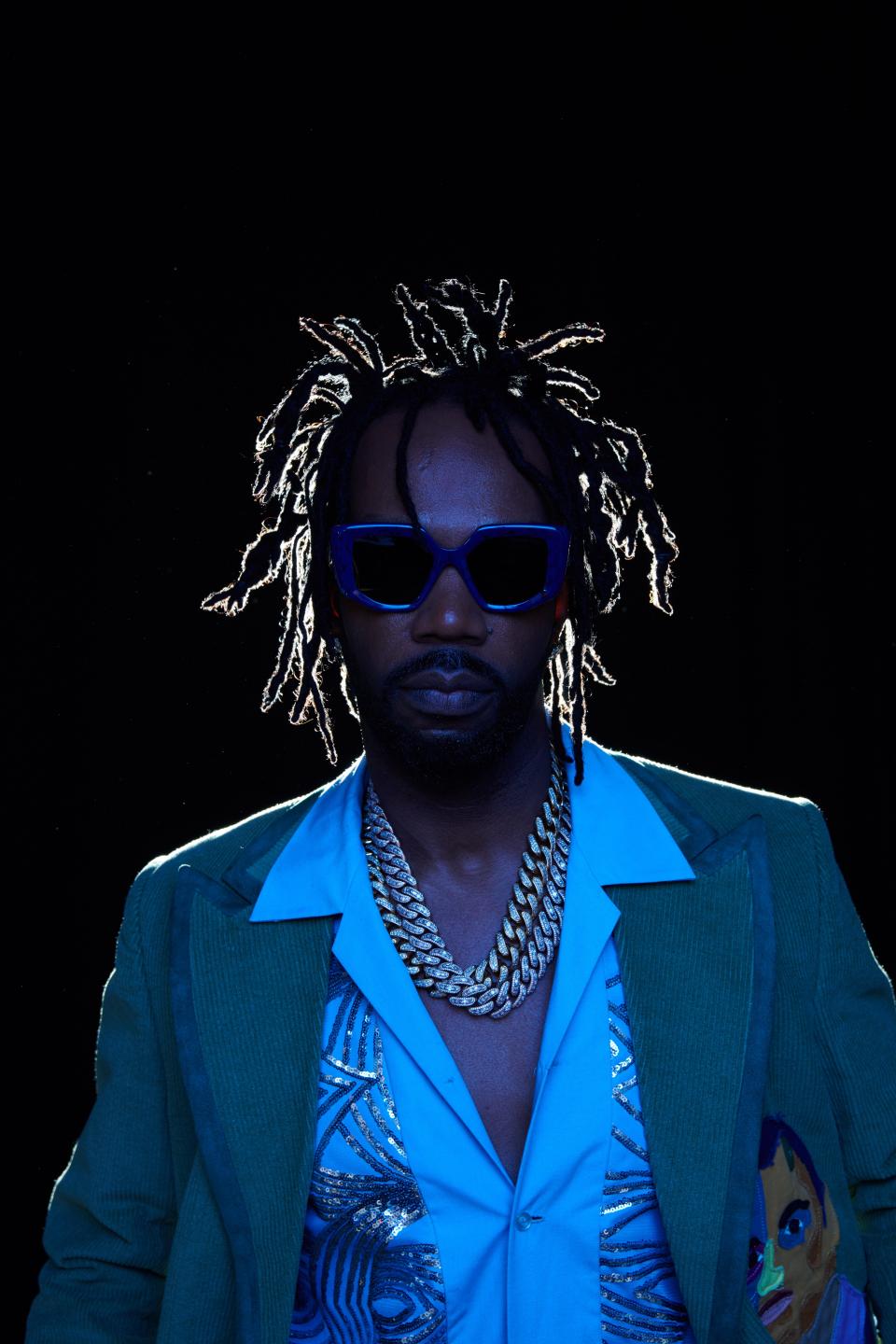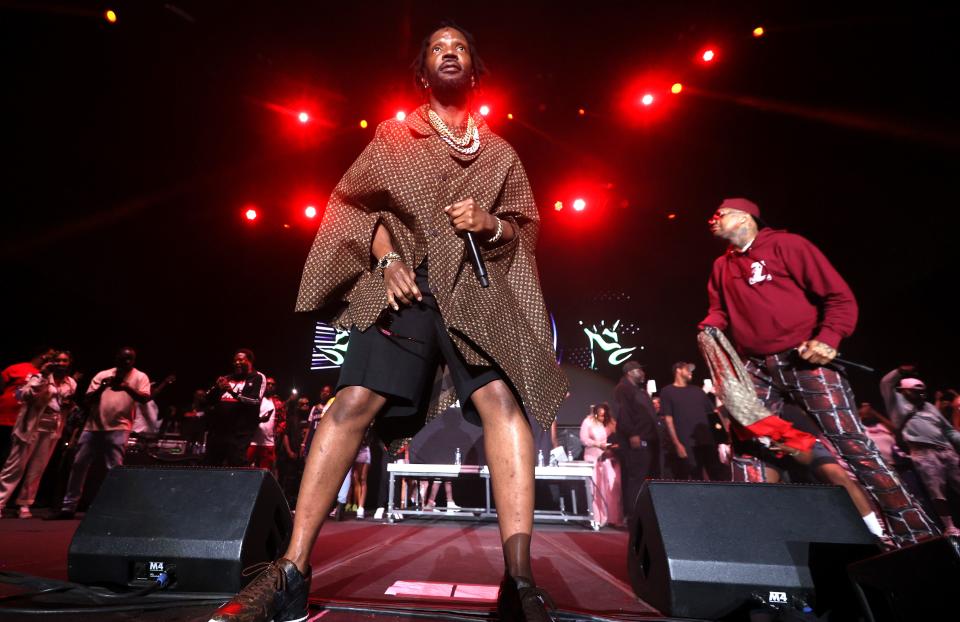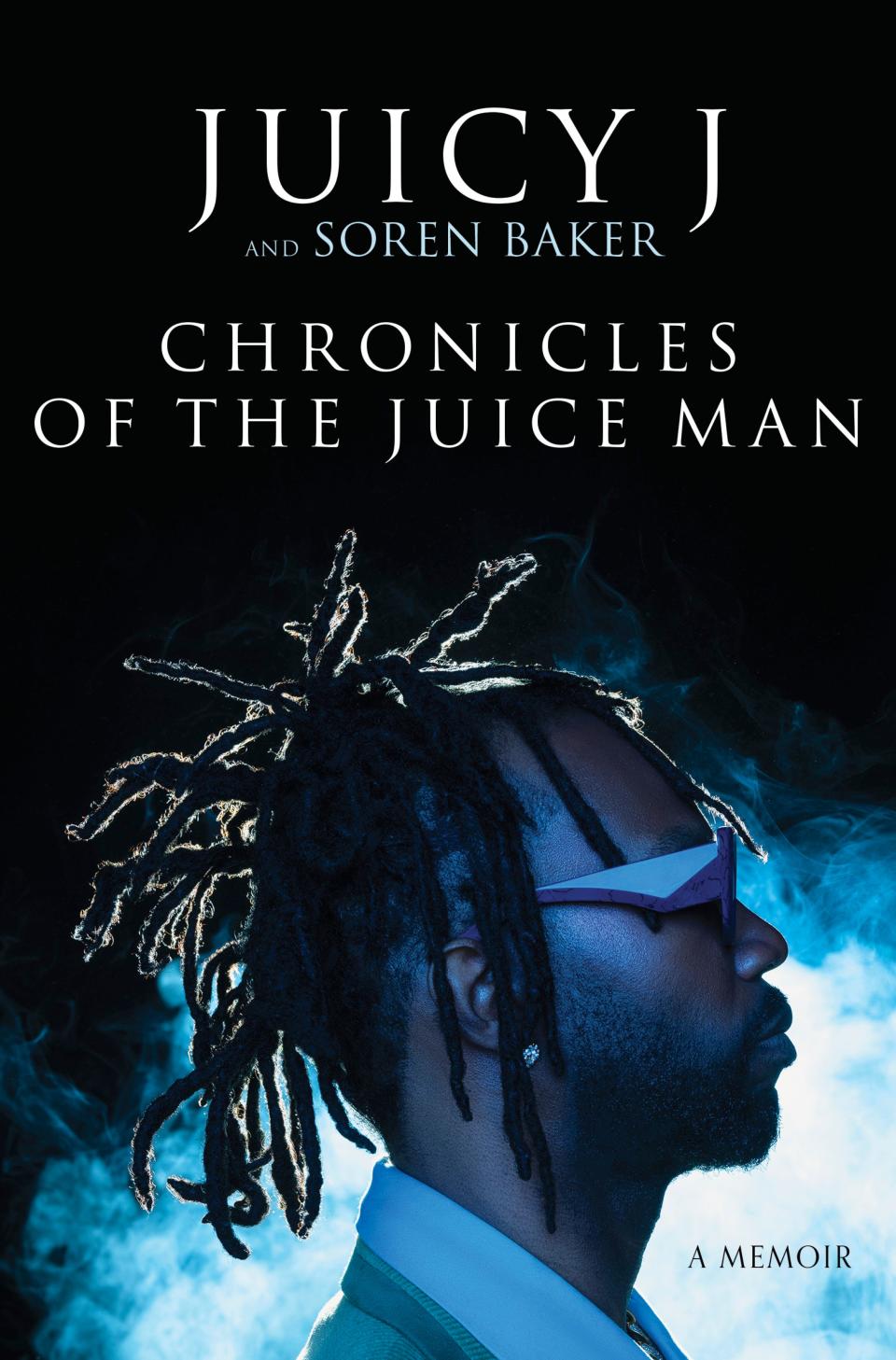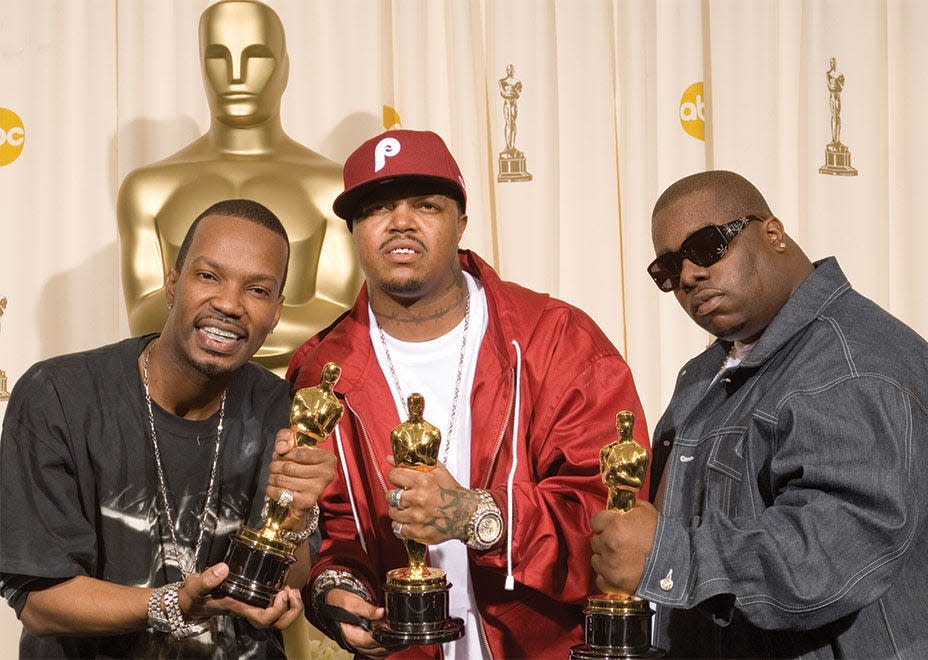Juicy J's confessions: Rap icon on Three 6 Mafia, Oscar win and why he has no regrets
- Oops!Something went wrong.Please try again later.
- Oops!Something went wrong.Please try again later.
- Oops!Something went wrong.Please try again later.
- Oops!Something went wrong.Please try again later.
- Oops!Something went wrong.Please try again later.
“Memphis is an evil place.”
That’s the first sentence of the first chapter of "Chronicles of the Juice Man: A Memoir" by Jordan Houston III, better known as Juicy J, the Oscar-winning multi-platinum recording artist who is co-founder of the influential Memphis rap group, Three 6 Mafia.
“Memphis is a dark city, literally and figuratively,” Juicy J continues, in his new autobiography. "It rains and you have thunderstorms...
"Throughout my childhood, it was overrun with crime and mayhem. I felt like Memphis literally was Hell.”

Yet, some pages later, Juicy J writes: “As I get older, my love for Memphis continues and has only deepened.” He says Three 6 Mafia made a "mistake" when, after its Best Original Song victory at the Academy Awards ceremony in 2006, he and group co-founder DJ Paul temporarily relocated from Memphis to "fake and phony" Hollywood.
Contradictions and confessions pulse through the pages of “Chronicles of the Juice Man” like a beat — a heartbeat, perhaps, or the programmed drumbeats that add rhythms that are both inviting and unnerving to many of Three 6 Mafia's song sagas of crime, sex, drug use and club life.
For Juicy J — who, after 9/11, would board an airplane only if accompanied by the twin comforts of Xanax and a Bible — good and bad are in eternal tension.
“Winning the Oscar ended up being one of the best and most painful experiences of my life,” Juicy J reveals, remembering how shocked he was at the “hate” directed his way by apparently jealous members of the Black community in Hollywood, including a surly Will Smith. (Writes J: “As someone who grew up loving his music, television shows, and movies, that hurt more than anyone could imagine.”)
"We were selling out shows and making a lot of money," Juicy J writes. "On the other hand, I was empty… It was a real fight to control my mind. Sometimes my internal battle got so bad that I would cry myself to sleep at night."
Music addict

Arriving in hardcover Sept. 5 from Hanover Square Press (a division of HarperCollins), "Chronicles of the Juice Man," written in collaboration with veteran author and hip-hop journalist Soren Baker, is a candid memoir that traces the musician's path from childhood to celebrity, from by-any-means-necessary creativity (crafting beats on a stolen Akai sampler) to Hollywood excess ("orgies" and offers of "cotton candy-flavored cocaine").
In the book, Juicy J presents himself as a lifelong music addict whose devotion to his art saved him from the hard-drug addictions and tragic fates of three of the original Three 6 crew, all of whom died in their early 40s. Lord Infamous (Ricky Dunigan), died in 2013; Koopsta Knicca (Robert Cooper Phillips), died in 2015; and Gangsta Boo (Lola Mitchell), died Jan. 1, leaving Juicy J, DJ Paul (Paul Beauregard) and Crunchy Black (Darnell Lorenzo Carlton) as the surviving original members.
"I feel like it was time for me to step up and speak up," said Juicy J, 48, in a phone interview from his home in Las Vegas (he also owns property in Memphis and elsewhere), explaining why he is adding "author" to a résumé that includes rapper, songwriter, producer, actor and entrepreneur.
He said his desire to summarize his life to date was partly inspired by the 2022 death of his beloved mother, Shirley Jean Houston, a librarian and substitute teacher whose career provided an example for a book that offers career guidance to young artists facing their own distractions as they enter the music business. "Writing this book, she was with me every step of the way," he said.
As Juicy J spoke, his 2-year-old son and 5-year-old daughter could be heard playing in the background. They might have been playing with his Academy Award, but Juicy J said he had hidden the gold statuette in a closet, because "they love messing with my Oscar. They get a marker and draw on stuff."
MEMPHIS RAP: The best Memphis rap albums of 2023 (so far), from Moneybagg Yo to Gloss Up to NLE Choppa
'Just an illusion'
Soren Baker, the book's co-author, called Juicy J a "visionary."

"This is a guy from North Memphis, growing up in a two-bedroom apartment with his family, and coming up at a time when Memphis was not known as a rap city, who was able to get to the highest of heights in rap history," Baker said. "He is a visionary in music and I really hope that when people read 'Chronicles' they'll get a better understanding of how significant his work is and how he was able to navigate the streets of Memphis and become a worldwide phenomenon."
For Juicy J, "Chronicles" is a sort of "Redemption Song," to borrow the title of a Bob Marley composition (Marley is not mentioned in the book, but Juicy J does cite such influences as Stevie Wonder, Prince, Michael Jackson, Biz Markie, and DJ Jazzy Jeff, along with such Memphis artists as Isaac Hayes and hip-hop pioneers DJ Spanish Fly and DJ Squeeky). For all its harrowing reports of druggy misbehavior and gunplay (during a fight on a tour bus, DJ Paul orders a security guard known as "Medicine Man" to shoot Koopsta Knicca), the book is ultimately upbeat, with Juicy J eventually finding professional, personal and spiritual satisfaction through collaborations with such artists as Katy Perry and The Weeknd; home life with his kids and his wife, Regina Perera; and a trust in God that brings "happiness and peace."
"I thought money and fame and girls and kicking it was most important, but that's just an illusion," Juicy J said. "That feeds the flesh but it don't really help the heart. God and enjoying your life and giving back to the community, I feel like that's what life's all about."
As Juicy J writes in his book: "I'm done with being a miserable rich person."
Millions of records
Although the Memphis milieu is specific, the book's narrative may be familiar to those who have read other rags-to-riches chronicles about young likeminded friends who create crude but expressive music that finds an audience that attracts distribution (via local company Select-O-Hits, in Three 6 Mafia's case) and then national label attention, resulting in bigger budgets, more sophisticated recordings, and various associated opportunities, challenges and conflicts.
As teenagers, Juicy J and DJ Paul created cassette mixtapes, sold on the street or at record stores and car stereo shops. They were still in their teens when they formed Three 6 Mafia, which made its public debut in 1995 with the underground album "Mystic Stylez," which merged a menacing "horrorcore" sound with violent, nihilistic lyrics. Subsequent records were similarly hardcore but less extreme, and "by 2003, we had sold millions of records and made millions of dollars," writes Juicy J (who was 28 in 2003).
He credits the 2000 hit "Sippin' on Some Syrup" with introducing Three 6 to white audiences; the song sold millions of copies. Another hit was "Tear Da Club Up '97," an example of the Memphis "get buck" or "crunk" sound that Juicy J calls "chant" music, for choruses that invite audiences to chant loudly in unison with the rappers ("Tear da club up! Tear da club up!").

Comparing himself in "Chronicles" to Otis Williams, the Temptations member who for decades worked to preserve the group as an active outfit, Juicy J spends much of the book "trying to keep everyone in line so that we could all succeed and get paid. They were all wild, though.” (A typical observation: "Koopsta was in jail all the time, even more than Crunchy Black.") Though frequently high on pills, alcohol, weed and "syrup" and almost always "strapped" (carrying a gun), Juicy — scared away from cocaine by childhood memories of reading about the overdose death of basketball star Len Bias — avoided "blow" and heroin, and functioned as a self-appointed ringmaster/den mother for an irrepressible cast of frequently reckless characters that included Project Pat, Gangsta Blac, Playa Fly, Lil Wyte and Frayser Boy (a fellow Oscar-winner, as co-writer of "It's Hard Out Here for a Pimp," with Juicy J and DJ Paul), to name a few.
Highly ambitious, Juicy J read Rob Bowman's 1997 book "Soulsville U.S.A.: The Story of Stax Records" about "100 million times," he writes, and dreamed of creating a Memphis-based label that would rival Stax in significance and sales success; he says he did that with Hypnotize Minds, a label he created in 1997 with DJ Paul that has sold millions of records showcasing Three 6-associated artists. The hit Stax concert documentary "Wattstax" helped fuel Juicy J's interest in film, so he jumped at the chance to provide music for Craig Brewer's Memphis movie "Hustle & Flow"; the Oscar win that resulted was unprecedented for a rap group.
MEMPHIS IN MAY 2022: Three 6 Mafia show feels like historic homecoming at Beale Street Music Festival
'Memphis built me'
In the book, Juicy J wonders if "the street code" that guided his life as a young man is "really real. Is it a myth? A fairy tale?" But growing up, he said on the phone, he rarely had time for such philosophizing.
"Living in Memphis, man, they made me tough and made me hard, and that wasn't ever my plan," he said. "My plan was about making music, but it's just like coming up in North Memphis, they turn you into this monster." He said he has seen therapists — "a few of 'em" — to try to make sense of his experiences.
The Los Angeles-based Baker — who also co-authored Atlanta rapper Gucci Mane's motivational memoir, "The Gucci Mane Guide to Greatness," from 2021 — said he and Juicy J worked on "Chronicles" for close to two years. He said the intention was "to make it as close to 100 percent accurate as possible," and to ensure that "it's his voice telling the story. I gave it shape and gave it a flow, but it's his words and his voice."

Baker said he hopes readers find the book. So far, no Memphis event is scheduled in connection with "Chronicles," and the authors are not undertaking a traditional book tour. However, Juicy J has some TV appearances lined up to promote the book, including a Sept. 5 visit to ABC's "Good Morning America."
Juicy J said that for all the "fear" and "extreme" behavior that was part of his early years in Memphis, "I have no regrets." He said his rough past led him to his hopeful, successful present.
"I owe everything to Memphis," he said. "Memphis built me. If it wasn't for Memphis, I wouldn't be anywhere at all."
This article originally appeared on Memphis Commercial Appeal: Juicy J talks Three 6 Mafia, Will Smith, love for Memphis in new book

